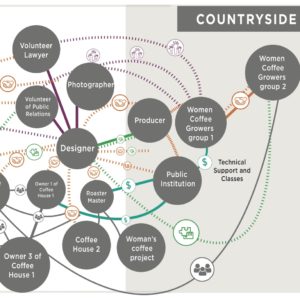From 2019 to 2023, Frederick was part of the research committee that laid the foundations for the Prospective Design graduate program at UTFPR, the first of its kind in the nation. The Master’s course was officially launched in 2025, and a PhD track is expected to be launched by 2030.
The program aims to train design researchers who can contribute to structural transformations that foster more sustainable and socially just realities. Unlike most graduate design programs focusing on artifacts, this program addresses broader socio-technical structures such as energy systems, urban mobility, and housing organization. The program emphasizes interventions that value relational qualities like sustainability, equity, resilience, freedom, and solidarity, moving beyond the intrinsic qualities of artifacts. The program is organized in two main research lines:
Infrastructures
- Focuses on the organizational, operational, and productive bases of societal structures. This includes tangible systems such as energy production, urban mobility, raw material supply chains, waste management, and public policies, as well as less tangible infrastructures like education and health systems.
- The research aims to analyze, question, and transform these infrastructures to align with relational qualities such as sustainability, equity, and conviviality. By doing so, it seeks to foster more inclusive and resilient societal systems.
- Projects in this line explore sustainable materials and processes, hybrid environments, participatory methods, and innovative solutions for managing and designing infrastructure.
Metastructures
- Deals with the ideological, political, ethical, and symbolic dimensions of societal structures, such as cultural values, traditions, aesthetics, and beliefs.
- This line investigates how meta-narratives influence human behaviors, social norms, and the legitimization of existing structures. By reimagining these meta-narratives, the research seeks to promote relational qualities such as freedom, equity, and solidarity.
- Projects focus on analyzing cultural values, image production (e.g., cinema, advertising), and the role of designers in shaping more diverse and inclusive future narratives.
Both lines are deeply interconnected and aim to foster structural transformations by addressing both the material and symbolic aspects of societal systems.
Research agenda overview
Core courses
- Prospective design studies
- Prospective design education
- Design research methods
- Metadesign studio
- Infradesign studio
Electives
- Relational qualities aesthetics
- Structuralism and post-structuralism in design
- Participatory design and collective prospection
- Material prospection and sustainable processes
- Cognition and complexity
- Prospective information design
A brief history of the program’s codesign process
In 2019, UTFPR’s Industrial Design Academic Department was ready to submit a new graduate program proposal to the CAPES National Research Agency based on the traditional distinction between product and graphic design. Given the agency’s new priorities to approve only innovative curricula, the proposal had to be quickly rethought from scratch. In only 6 months, UTFPR design faculty developed a new shared foundation for their graduate program that overcame the traditional split between product and graphic design.
Instead of shaping research lines after the work of the most successful research in each area (product and graphic design) like most graduate programs do in Brazil, we decided to work in a participatory fashion to meet the innovative premise. Cayley Guimarães, a successful human-computer interaction researcher, was appointed as the future program’s head. Instead of bringing his peers closer to his field of expertise, he adopted a Participatory Design approach to design the research program. Having plenty of experience with that, I worked closely with Cayley to shape the first phases of this process.
We launched the initiative by sharing our historical research objects using Lego Serious Play. I asked each researcher to present their object using a metaphorical model. We preferred this method to encourage the flexibility needed to articulate that object in relation to the desired new shared research foundation.

After each researcher presented their object, we performed a collective whiteboard bottom-up convergent analysis. The researcher’s names were written at the bottom, and their objects were translated from the Lego model to words on the board. The goal was to develop a new shared foundation by gradually adjusting the objects until they converged into research lines written on the top.

Researchers’s convergence gradually became clearer through a range of other visual artifacts. Professor André de Souza Lucca heavily explored what information design could do for us to come up with our new shared foundations. Coming up with a flower diagram in which researchers’ names appear as petals and designerly ways of knowing to appear as seeds was a significant achievement. Still, this diagram did not yet convey the desired level of research innovation we needed.

We decided to reread and discuss foundational texts in design research, including Nigel Cross’s article on the so-called designerly ways of knowing. We were looking for what is essential in design research, what was missing, and where the field was heading.

Carnegie Mellon’s Transition Design PhD program emerged as a benchmark for us. We delved into Transition Design for a few weeks and considered settling with a renewed focus on sociotechnical systems and their contradictions with natural systems. Professor Fernanda Botter graphically facilitated our understanding of multi-level perspective over sociotechnical transitions. She smartly sketched our vision over existing models projected on a whiteboard.

My own research object included decolonizing design, and I noticed a mention of Boaventura de Sousa Santos’s work in Transition Design’s introductory article by Terry Irwin. At that time, Boaventura had just released The Cognitive Empire, a book that expands his previous work on the Epistemologies of the South. My peers felt encouraged by this concept, as it validated our attempt to stay attuned to the Brazilian reality. When facing the challenge of translating Transition Design to Portuguese (Design de Transições and Design Transicional), we realized the term would not make sense in a nation that does not need to transition to a more sustainable lifestyle.
In 2019, Brazil already had a more sustainable lifestyle than the United States. Public-transport-based dense cities, higher proportion of renewables in the energy matrix, solidarity economy circuits, and many more trending approaches in the US were already a reality in Brazil. In a moment of anti-imperialist epiphany, we realized the United States should learn with us, not the other way around. Importing and translating Transition Design would not work for us. We decided then to create another term to convey what we were doing. This is how we came up with Design Prospectivo (easily translated as Prospective Design).
After rereading and discussing Buchanan’s four orders of design and Ceschin and Gaziluzoy’s evolutionary framework, we noticed an expansion of design research from small to larger-scale design objects. Andre Lucca and Cayley Guimarães put together our collective reflection in a similar visual scheme.

To be continued…
Papers outlining the research program
Botter, F., van Amstel, F. M. C., Mazzarotto Filho, M., and Guimarães, C. (2024) Prospective design: A structuralist design aesthetic founded on relational qualities, in Gray, C., Hekkert, P., Forlano, L., Ciuccarelli, P. (eds.), DRS2024: Boston, 23–28 June, Boston, USA. https://doi.org/10.21606/drs.2024.883
Saito, C., Freese Gonzatto, R., and van Amstel, F. (2024) Anticolonial prospects for overcoming the coloniality of making in design, in Gray, C., Hekkert, P., Forlano, L., Ciuccarelli, P. (eds.), DRS2024: Boston, 23–28 June, Boston, USA. https://doi.org/10.21606/drs.2024.255
Guimarães, C., & Van Amstel, F. M. C. (2024). Prospectando qualidades relacionais na educação em Design através da quilt-terapia. Arcos Design, 17(1), 190–211. https://doi.org/10.12957/arcosdesign.2024.77916
Mazzarotto. M., Van Amstel. F. M. C., Serpa, B. O., Silva, S. B. (2023). Prospecting anti-colonial qualities in Design Education. V!RUS Journal, 26, 135-143. Translated from Portuguese by Giovana Blitzkow Scucato dos Santos. Available at:http://vnomads.eastus.cloudapp.azure.com/ojs/index.php/virus/article/view/833
Van Amstel, Frederick M.C.; Guimarães, Cayley; Botter, Fernanda. (2021). Prospecting a systemic design space for pandemic responses. Strategic Design Research Journal, 14(1), pp.66-80. DOI: https://doi.org/10.4013/sdrj.2021.141.06

